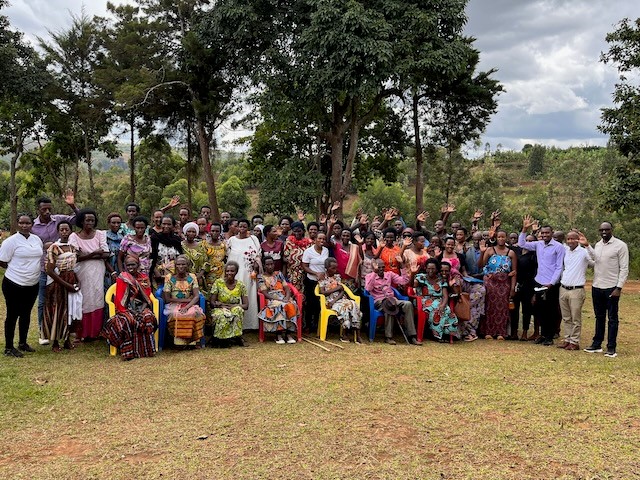
A guest post from Rebecca Tinsley, Founder of Network for Africa
We drive up a rough, rutted road of red dirt to a simple, rectangular, breeze-block building with a corrugated iron roof – the community meeting place or village hall. The sound of roosters crowing drifts across the valley, along with the aromatic smoke from cooking fires. Below us on the valley floor, women in dazzling patterned traditional Rwandan dresses work in the fields. On the roads, skinny, muscular men push bikes loaded with vast bunches of bananas up impossibly steep hills toward market.
The Network for Africa team unfolds its limbs from the 4WD after an hour’s journey from the capital, Kigali. Although we are all familiar with Rwanda, on the journey here we are awed by the beauty of the landscape. It is known as the land of a thousand hills for a good reason. It is neither too hot nor too cold, year around. At first glance, it is Shangri-La, but it is a paradise with a horrific recent history. Nor can its twelve million citizens eat the gorgeous scenery: life is hard for the vast majority of them.
Visiting our project
We have come to visit our project, run with our long-time local partner Survivors Fund (SURF), the survivors’ fund. With us today is Dr Shelly Evans, our volunteer psychotherapist from Missouri. Several years ago, Shelly trained SURF’s lay counselling teams in how to teach people to manage their post-traumatic stress disorder. This will be her first opportunity since the pandemic to judge how successful her training has been.
Inside the village hall, we meet dozens of local survivors, some of whom are related by blood to each other, but most of whom are not. For years, we and SURF have concentrated on the young people orphaned by the 1994 genocide. Apart from regular trauma counselling – individually and in groups – we have supported efforts to help people get into the workplace, including loans and skills training. Along the way we helped SURF build dozens of homes for groups of orphans called child-headed households; and we found kind sponsors to ensure orphans could finish their education.
Making a difference
But recently, our Rwandan partners have told us about an increasing problem – there are many older people who have found themselves alone because of the genocide. They stay inside their huts, isolated from the world beyond their front door. The counsellors trained by Shelly before the pandemic have reached out to these lonely individuals, bringing them to join group sessions.
What we could not predict was that links would spontaneously form between the orphans and the older people. This isn’t just a case of younger people checking on the older folks occasionally to make sure they are all right, or doing errands for them. As we listen to their testimony, it soon emerges that these are strong bonds that amount to solid friendships. In a society where family connections mean everything, it is significant that these people have created powerful new links.
Speaker after speaker tells us of their new-found joy at having a young friend who sits and talks to them, who shares stories of everyday events, or their more painful shared history. Despite the horror in their past, the atmosphere in the village hall is joyful. Shelly’s counsellors are understandably proud of their achievements, and Shelly is delighted that her efforts have been so successful.
The spontaneous happiness we encounter in a humble shed in rural Rwanda is in contrast to the societies we come from, where despite our material advantages, we have millions of citizens confronting mental health issues that range from the sadness stemming from unrealistic expectations to severe depression, exacerbated by the pandemic and the cost-of-living crisis.
Having read this far, you might conclude that enabling bonds between the vulnerable young and isolated old people to flourish is also needed in the developed world. And you would be right. But in the meantime, please take a moment to celebrate what Network for Africa and SURF are achieving in our counselling groups across Rwanda. A special thanks from us to Shelly and her counsellors. Thanks also to our supporters who have made this work possible. If you feel able to, please visit our website to continue helping us. Thank you.
Rebecca Tinsley
